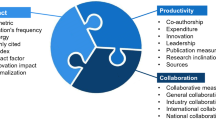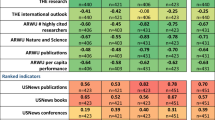Abstract
This paper examines policy-relevant effects of a yearly public ranking of individual researchers and their institutes in economics by means of their publication output in international top journals. In 1980, a grassroots ranking (‘Top 40’) of researchers in the Netherlands by means of their publications in international top journals started a competition among economists. The objective was to improve economics research in the Netherlands to an internationally competitive level. The ranking lists did stimulate output in prestigious international journals. Netherlands universities tended to perform well compared to universities elsewhere in the EU concerning volume of output in ISI source journals, but their citation impact was average. Limitations of ranking studies and of bibliometric monitoring in the field of economics are discussed.
Similar content being viewed by others
References
Bouwmans, H. (2000), Jong talent blijft buiten de top-5. Intermediair, 30: 31–33.
Buijtendorp, T. M., Langman, M. A. (1985), De Nederlandse economen top-30. Economisch Statistische Berichten, 25 December, 1305–1307.
Coupé, T. (2003), Revealed performances. Worldwide rankings of economists and economics departments. Journal of the European Economic Association, 1: 1309–1345.
Davis, J., Huston J., Patterson, D. M. (2001), Scholarly output of economists: A description of publishing patterns. Atlantic Economic Journal, 29: 341–349.
De Schuite, A. D. S. (1983), Nieuwe Nederlandse Top-40 van de Nederlandse economen. Intermediair, 19(13): 13–15
De Schuite, A. D. S. (1986), Een nieuwe Nederlandse top-econoom!Intermediair, 22(52): 33–35
De Schuite, A. D. S. (1987), Nieuwe Nederlandse Economen. Intermediair, 23(52): 9–11.
Donovan, C., Butler, L. (2005), Testing Quantitative Indicators of the Quality and Impact of Research in the Social Sciences: A Pilot Study in Economics. REPP discussion paper 05/2.
Hazeu, C. (1986), Het meten van weten. Economisch Statistische Berichten, July 16, 705–707.
Johnes, G. (1988), Determinants of research output in economics departments in British universities. Research Policy, 17: 171–178.
Kalaitzidakis, P., Mamuneas, T., Stengos, T. (2003), Rankings of academic journals and institutions in economics. Journal of the European Economic Association, 1: 1346–1366.
Leibowitz S. J., Palmer, J. P. (1988), Assessing assessments of the relative quality of Economics departments. Quarterly Review of Economics and Business, 28: 88–113.
Moed, H. F., De Bruin, R. E., Van Leeuwen, T. N. (1995), New bibliometric tools for the assessment of national research performance: Database description, overview of indicators and first applications. Scientometrics, 33: 381–425.
Nederhof, A. J. (2006), Bibliometric monitoring of research performance in the Social Sciences and the Humanities: A review. Scientometrics, 66(1): 81–100.
Nederhof, A. J., Van Raan, A. F. J. (1993), A bibliometric assessment of six economics research groups: A comparison with peer review. Research Policy, 22: 353–368.
Nederhof, A. J., Van Wijk, E. (1994), Research Performance of Netherlands’ Economics Departments in National and International Perspective. Leiden, Report CWTS.
Nijkamp, P. (1992), Towards performance measurement of economics research in the Netherlands. Research Evaluation, 2: 66–72.
Sivertsen, G. (2006), A bibliometric model for performance based budgeting of research institutions. Lecture presented at the 9 th International Conference on Science & Technology Indicators, 7–9 September 2006, Leuven, Belgium.
Sternberg, R., Litzenberger, T. (2005), The publication and citation output of German faculties of Economics and Social Sciences-a comparison of faculties and disciplines based upon SSCI data. Scientometrics, 65: 29–53.
Tijssen, R. J. W., Nederhof A. J., Coupé, T., Visser, M. S., Van Wijk, E. (2002), Bibliometric Mapping of Scholarly Excellence in European Economics Research. Report to European Union, DG-RTD, Unit K-2, Brussels, Belgium. Leiden: CWTS.
Tombazos, C. G. (2005), A revisionist perspective of European research in economics. European Economic Review, 49: 251–277.
Van Duijnen, J. J. (1981), De Nederlandse economen top-30. Economisch Statistische Berichten, 18 November, 1143–1145.
Van Leeuwen, T. N. (2006), Unpublished data. Leiden: CWTS.
Visser, M. S., Moed, H. F., Spruyt, E., Nederhof, A. J. (2004), Bibliometrische studie van de Faculteit Toegepaste Economische Wetenschappen aan de Universiteit Antwerpen, 1992–2001, Leiden: CWTS.
Author information
Authors and Affiliations
Corresponding author
Rights and permissions
About this article
Cite this article
Nederhof, A.J. Policy impact of bibliometric rankings of research performance of departments and individuals in economics. Scientometrics 74, 163–174 (2008). https://doi.org/10.1007/s11192-008-0109-0
Received:
Published:
Issue Date:
DOI: https://doi.org/10.1007/s11192-008-0109-0




